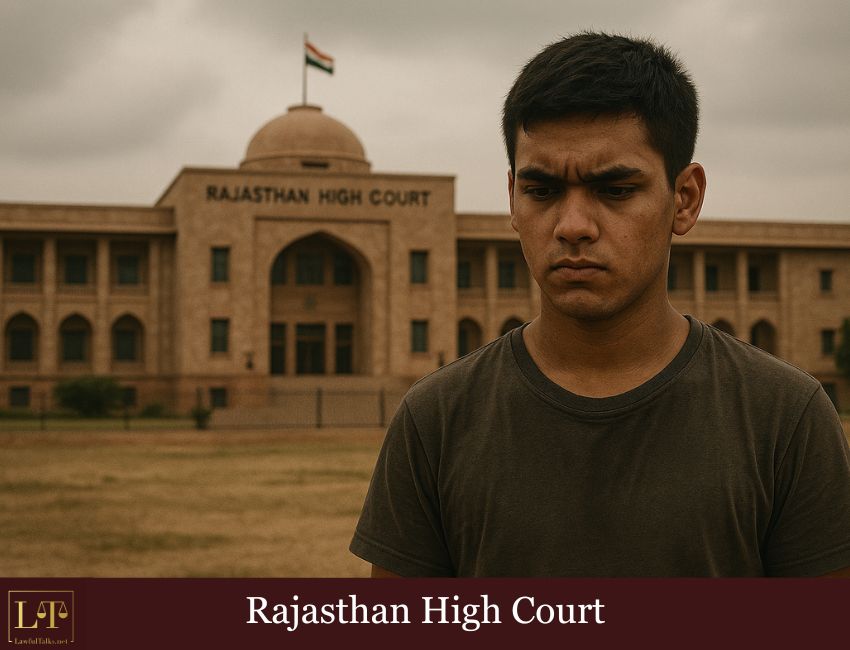Allahabad HC Sets Aside Afzal Ansari's Conviction, Allows Him to Continue as MP

A revision petition filed by a juvenile offender, accused of a brutal murder was dismissed by the Rajasthan High Court, taking into consideration the gravity of the offence and the direct involvement of the youth. The petitioner appealed for bail by invoking the protective provisions of the Juvenile Justice (Care and Protection of Children) Act, 2015.

A juvenile court in Bikaner had earlier denied him bail and the High Court’s dismissal upholds this ruling.
The High Court Bench which was presided over by Justice Manoj Kumar Garg.
The petitioner had approached the High Court under Section 483 of the Bharatiya Nagarik Suraksha Sanhita (BNSS) However, the High Court Court maintained that considering his direct involvement in the gruesome murder no case was made out for interference in the lower court’s order.
Facts:
The case pertains to the alleged murder of one Pappu Sah, wherein the petitioner, along with co-accused Govind Kumar, were said to have committed the offence in a brutal and premeditated manner. The prosecution claimed that the deceased had sustained multiple injuries, suggesting deliberate intent and cruelty, thus attracting charges under Sections 103(1), 238(A), and 3(5) of the Bharatiya Nyaya Sanhita (BNS).
The petitioner’s counsel argued that the accused was a juvenile at the time of the incident and had been falsely implicated without any solid evidence. It was also submitted that the petitioner had been in custody for a long time and that the Probation Officer’s report did not contain any adverse remarks against him.
Emphasis was placed on the principle that bail should be the rule and detention the exception for juveniles, as per Section 12 of the Juvenile Justice Act.
In support of the plea, various judgments were cited, including Juvenile in Conflict with Law vs. State of Rajasthan & Anr. (SLP Crl. No. 9566/2024), CCL A vs. State (NCT of Delhi), Child in Conflict with Law vs. State of Gujarat, and X vs. State of Uttarakhand, where juveniles were granted bail in similar or more lenient circumstances.
However, the High Court distinguished the facts of the present case from those precedents. The Court noted that the Juvenile Justice Board, Bikaner, had already conducted a preliminary assessment under Section 15 of the JJ Act and concluded that the petitioner was fit to be tried as an adult due to the serious nature of the offence and his mental maturity.
Unlike the cited cases where either the evidence was circumstantial or the role of the juvenile was minimal, here the petitioner was alleged to have directly participated in a heinous murder.
The Court observed that although the Juvenile Justice Act favors the release of children on bail, such release is subject to the condition that it should not expose the child to moral, physical, or psychological danger or defeat the ends of justice.
In this case, the Court was convinced that releasing the petitioner at this stage could compromise the judicial process and public interest. Reference was also made to past decisions like Vishal @ Ritik vs. State of Rajasthan and Rahul Solanki vs. State of Rajasthan, where courts have held that juvenile bail can be denied in exceptional cases involving grave offences.
In conclusion, the High Court held that the lower courts had rightly denied bail after evaluating all aspects, including the seriousness of the crime, the petitioner’s role, and the findings of the Juvenile Justice Board.
The Court found no illegality or irregularity in the impugned order and therefore dismissed the revision petition.
However, the petitioner was granted liberty to file a fresh petition after the Forensic Science Laboratory (FSL) report is received, if any new substantial ground arises that warrants reconsideration.
Leave a Comment

Pallavi Zende
Law Student
Latest Posts
Categories
- International News 19 Posts
- Supreme Court 327 Posts
- High Courts 340 Posts









































































































































































































































































































































































































































































































































































































































































































